Prof. Rodríguez Díaz completed his PhD in sociology at Yale University with Fulbright and Social Science Research Council fellowships. He is a full professor and has been chairman of the Department of Sociology and Director of the Doctoral Program in Sociology, at the University of Barcelona. He has been visiting professor at the Center for European Studies of Harvard University, at Yale University and at the University of California, Santa Barbara. His present research and publications focus on the role of social networks in organizations and societies, future studies, and the social dimensions of happiness. These lines of research converge in the study of the processes of transformation and articulation of Buddhism in modern society. For more information, see his webpage at the University of Barcelona or at academia.edu.
FEATURES|THEMES|Health and Well-being
Social Relations and COVID-19
Humans are a social species and social interaction is one of our strengths. Being anchored in a certain positive orientation toward others, as well as trust and an idea of reciprocity, has facilitated cooperation and care for the weakest members of society. This has made us stronger and has allowed humans to advance socially. Social relations have been the source of historical social organizations—groups, tribes, clans, communities—and of today’s global society. And with the advancement of relational systems, we realize that we live in a “small world” where the law of “six degrees of separation” places all humans just six steps from everyone else.
We are interconnected by strong and weak ties. In a Buddhist vision of reality, I am us, and I am also all, as I am linked to all, and therefore depending on all other people. Or, as the Dalai Lama always comments, we are seven billion interdependent people.
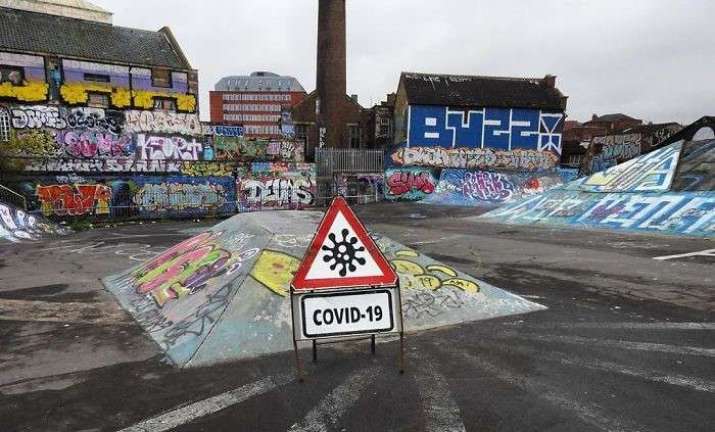 Bristol, England. From boredpanda.com
Bristol, England. From boredpanda.comSocial relations take the form of social networks and are conceptualized as social capital, an emerging social form that strongly defines society in the 21st century. Social relations and social capital facilitate access to material and immaterial resources, are fundamental in creating individual and collective identities, help or limit individual and collective action, and are ways to participate in the creation, maintenance, and change of societies. Relationships contribute to social cohesion, which in turn leads to social outcomes such as health, economic prosperity, happiness, and so on.
In a very general way, we can speak of two basic types of social relations: bonding and bridging. Bonding is the relationship that unites individuals or groups that have many things in common, creating similar social identities. They are trust-builders and facilitators of the group’s internal cooperation through strong links. They are dominant in traditional societies. Bridging refers to the ties that connect individuals or groups that are socially very distant through open and horizontal relationships. The rules of relational respect are based on similar social status, not on similar social identities. It requires that we cross our political, social, and professional identities to reach out to those whom we do not look like. This is especially important for democracy and diversity in modern societies.
In short, bonding relationships unite similar people and groups, resulting in closed structures with very high levels of trust. Bridging relationships unite different people and groups, uniting different social worlds through weaker levels of trust. These relationships cross social boundaries and increase tolerance and acceptance of different people, values, and beliefs. They are very important as they allow access to resources and opportunities from one social network to another. Family relationships as well as friendships are fundamentally of the bonding type. Relations with acquaintances are a clear example of bridging. Sometimes friendships, and distant relatives, can also be of the bridging type when connecting with external networks.
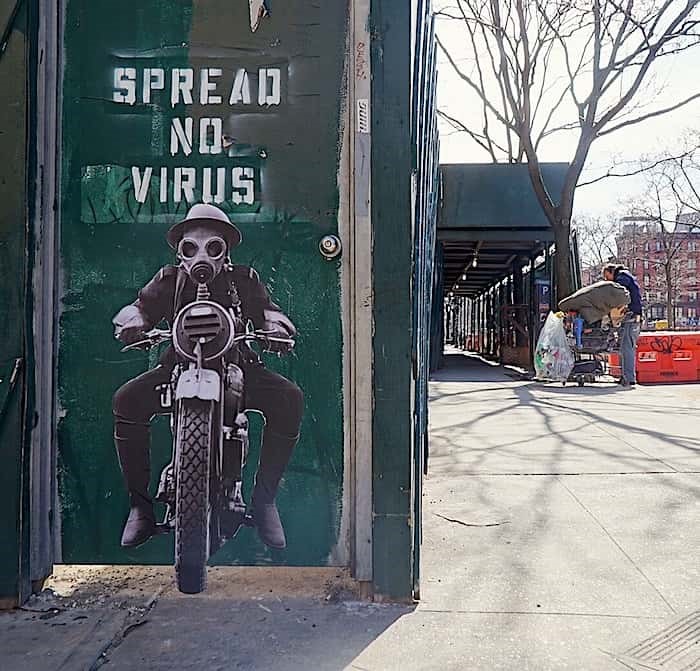
New York. From boredpanda.com
Social relations and COVID-19
Social relations are also the way infectious diseases spread and become pandemics—AIDS, Ebola, influenza, and COVID-19. Therefore, they appear to be a weakness of the social system. At the same time, it should not be forgotten that social relations have enabled the international scientific community to transmit ideas and knowledge, which has facilitated global cooperation and sped up responses to threats. In addition, social relationships have enabled support and care systems that have speeded the recovery of the sick.
Knowledge of the social networks through which the infection spreads has meant that responses to the pandemic have been precisely to try to stop and reduce weak social relations, the bridging relations that connect heterogeneous groups and societies. Given the rapid global spread of COVID-19, most affected countries have acted in very similar ways to prevent the spread: by closing borders and confining their populations by applying social distancing measures to greater or lesser degrees.
The health effects of such social closures can be measured in terms of infection rates, mortality rates, and curative success rates. In order to begin to analyze the social impact of these measures, we studied changes in social relations and daily life activities and values through the online survey “Social Relations and Daily Life During the COVID-19 Crisis,” carried out from 11 April–20 May 2020.*
Society is social relations; of cooperation, help, support, and so on. Some relations are strong and some are weak. The pandemic, in its effects on the vision that one may have of the relationship with the other as a potential danger, and the confinement and maintenance of social distance (a term used in health policies) have obviously had a major impact on social relations systems. Both the relational model and the relational priorities—reflected in more intense relationships—have changed.
Before lockdowns, most people’s daily relations were with acquaintances—colleagues, neighbors, and so on—followed by relations with close family members and friends (Fig. 1). While most contacts with acquaintances were daily, interactions with close family and friends were distributed between daily contacts—somewhat more frequent in family—and weekly—somewhat more frequent with friends. Interactions with extended family were very occasional.
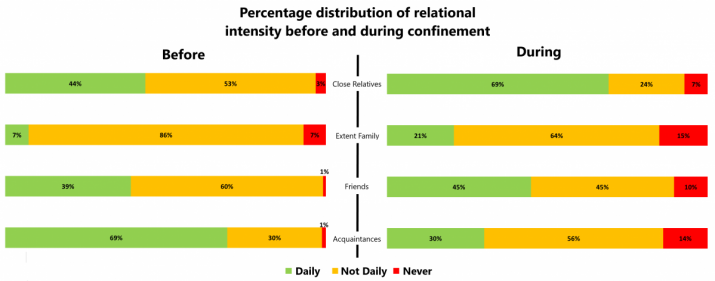 Fig. 1
Fig. 1During lockdowns, most people’s regular interactions were with close family members and to a lesser extent with friends. Daily contact with distant family members also increased substantially, although less frequent contact continued to dominate. Lockdowns caused a large reduction—more than half—in intense social interactions with acquaintances, making them more occasional or temporarily lost.
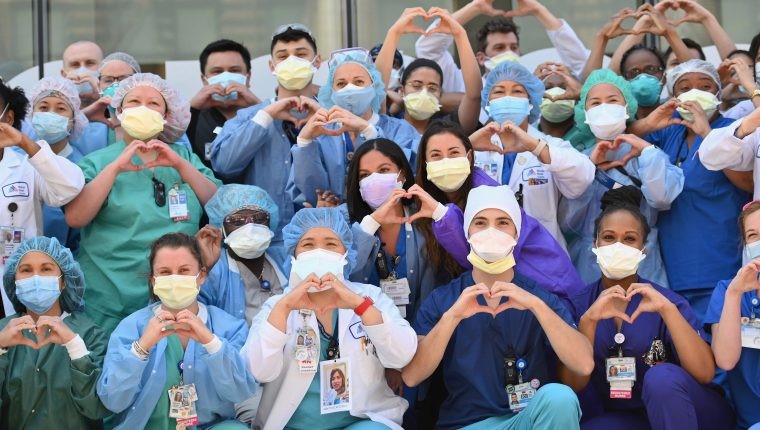
Nurses and healthcare personnel celebrate International Nurses Day outside Mt. Sinai Queens Hospital in New York City. From theatlantic.com
Fig. 2 shows transformations in relational patterns due to lockdowns. It can be seen that all relationships have suffered and decreased with all groups of people, although lost contacts have increased with social distance.
Contact with close relatives suffered the least (only 4 per cent have been lost), while the greatest loss in interactions has been with acquaintances (13 per cent). There is also a change in the form of the relationships: many occasional contacts with family (close and extended) are transformed into intense daily relations. In the case of friends, many weekly relationships become daily, but many more are lost. And in the case of acquaintances, a large part of daily contact becomes occasional (26 per cent) and many are also lost.
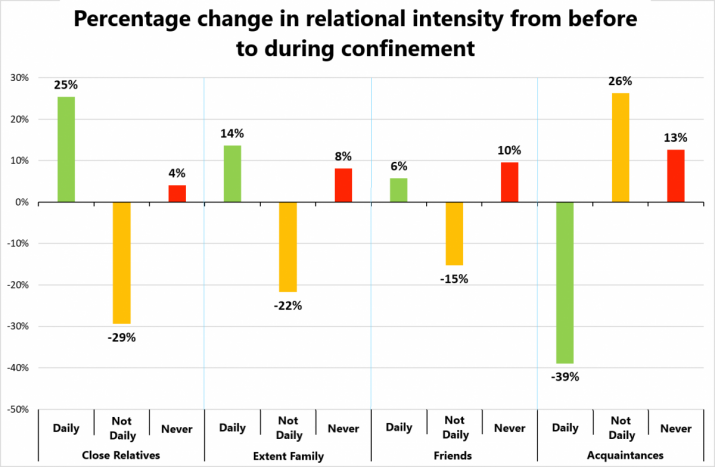 Fig. 2
Fig. 2The pandemic and lockdowns have caused radical changes in the model of social relations. Intense daily relationships increased where previously there was a dominance of weekly and occasional in relationships with family and friends, and previously daily relationships are now occasional or lost with acquaintances. Relations have intensified and so-called strong, identity-generating, and bonding ones have increased, while so-called weak bridging relationships with external social worlds have suffered.
Another form of social relationships are those built through religious practices. In our research we have seen that, following a similar pattern of intensification, daily religious or spiritual practice, whether individual or in group, has increased (Fig. 3). Meanwhile, less frequent practices—weekly or occasional—have greatly decreased.
With lockdowns, it was impossible to meet at and attend worship centers, so one could expect that collective religious practices would disappear. However, although they have been reduced, they have not disappeared. This may be due to the introduction of new technologies by some communities as a means to carry out collective practice. It is also possible that within some families that cohabitate, collective religious practices can now be carried out on a daily basis. Collective religious practices strengthen ties of cohesion and identity.
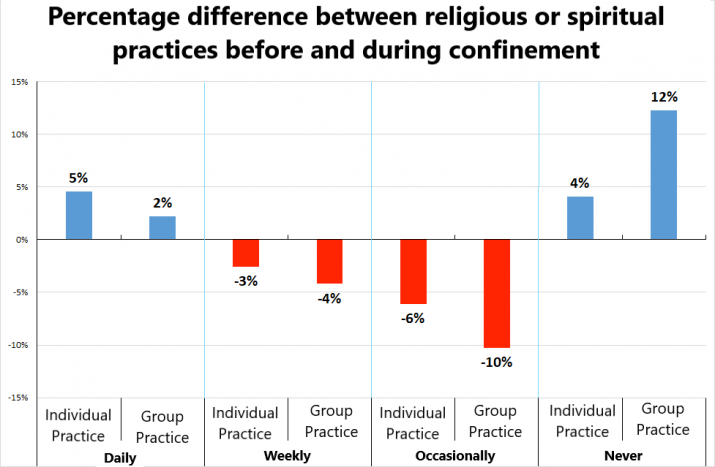 Fig. 3
Fig. 3A fundamental element in social relations is the vision of the other. In our research, we approach this conceptualization through the actions that the people who responded say they will implement to achieve a better future.** A large majority (71 per cent) say that they will be closer to their loved ones (the most important action), and 41 per cent say that they will help others more (in fourth position). The aforementioned relational pattern system has some consistency with the most important actions to build a better future: the first action associated with strong relationships and the second with weaker relationship systems. The first ones tend to the consolidation of cohesive and protective systems and the second ones tend to the construction of open and global systems.
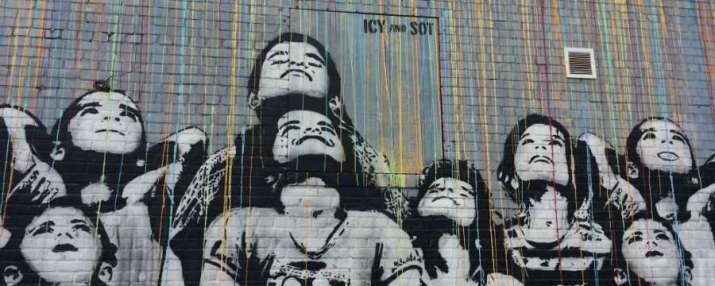 Spring Street Social. Street murals in Williamsburg, Brooklyn. From globalstreetart.com
Spring Street Social. Street murals in Williamsburg, Brooklyn. From globalstreetart.comThe second and third actions for a better future are taking care of the environment and changing consumption patterns. Both have an environmentalist orientation with a broader concept of others, and involve systems of relations between humans and the living environment.
The pandemic and ensuing lockdowns have brought about a change in relational patterns, strengthening strong cohesion relationships and weakening more distant and open social relationships. Perhaps this has also been an opportunity for introspection that has not only increased spirituality and daily religious practice, but has reinforced the importance of both types of social relationships for a better future.***
* Online survey: “Social Relations and Daily Life During the COVID-19 Crisis.”
** Covid-19 Survey. Preliminary Results 3: Most Likely Scenarios and Actions for a Better Future, University of Barcelona.
*** Buddhistdoor Global readers are invited to respond to the online questionnaire: “Social Relations and Daily Life During the COVID-19 Crisis.” The objective is to study the effects that the crisis has had, and is having, on social relationships and on people’s lives during and after lockdowns in order to identify the situations that contribute most to well-being and to be able to spread the same. You can answer the questionnaire here.

Related features from Buddhistdoor Global
Buddhistdoor View: Education in the COVID-19 Era – Online Similarities to Religious Adaptations
Coping with Fear, Anxiety, and Panic During the Pandemic
Harnessing Knowledge Technologies to Overcome Ignorance
Standing Together
From Hong Kong: How Mindfulness Practitioners Can Engage with Society in Difficult Times
Buddhistdoor View: Political Belonging Has Become a Religious Matter in India
Crowded and Dusty
Science and Meditation: New Developments in Buddhist Research
See all coronavirus-related content from Buddhistdoor Global














